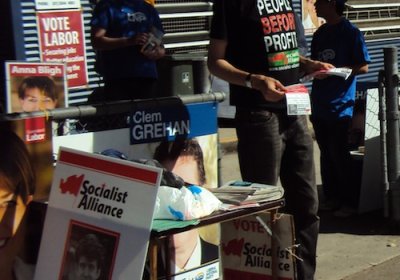The campaign to protect Western Australia's Kimberley region from gas extraction will be the topic of an April 19 meeting in Sydney.
WA Greens Senator Rachel Siewert, The Wilderness Society national director Lyndon Schneiders and Beyond Zero Emissions' Geoff Cameron will address the public forum, Saving the Kimberley: Our Land or Gasland?
917
Green Left Weekly's Susan Austin spoke to forest activist Miranda Gibson, who has lived for more than 100 days on a platform 60 metres up a Tasmanian old-growth tree. The “Observer Tree” has brought international attention to the campaign to protect Tasmania's forests. Gibson has vowed to continue her tree-sit until the campaign wins.
* * *
What prompted you to climb the tree and take this courageous action? What do you hope to achieve?
The NSW Coalition government is pushing ahead with plans to relocate Gosford Public School and sell the school site to commercial developers. The site has waterfront views and is considered prime real estate.
The decision comes despite a 10,000 strong petition against the plan collected by the Gosford community. Parents, teachers, students and supporters held a protest outside NSW parliament on March 29 while the petition was being read inside.
“I used to go fishing. I used to go to community meetings. I stopped doing that. I am tired because most of the time I am doing overtime.” Gamal Babiker, Cleaner.
Cleaners working for contracting giant Spotless walked from Chadstone to Melbourne’s CBD on March 26 to highlight the brutal workloads that force them to walk the same huge distances in their jobs every single day.
About 200 people attended a meeting on Sri Lanka organised by People for Human Rights and Equality, a group of people of Sri Lankan origin now living in Australia.
The meeting was addressed by Basil Fernando, a director of the Asian Human Rights Commission, and Britto Fernando, co-convener of the Platform For Freedom, a coalition of groups in Sri Lanka campaigning for freedom of expression and the right to live.
More than a year after the start of the “Arab Spring”, it is possible to draw up a provisional balance sheet.
Since January last year, popular rebellions have deposed a number of hated dictators across the region. It began with popular rebellions in Egypt and Tunisia, which spread to Yemen and Bahrain and through to the conflicts in Libya and Syria.
All of these rebellions, to varying degrees, reflected the emergence of powerful mass movements causing concern for imperialism and its regional allies — principally Israel, Saudi Arabia and Qatar.
The Socialist Alliance (SA) pushed ahead with its campaign to put socialist politics before the Queensland electorate, as the ALP government faced annihilation in the state election held on March 24. Although everyone knew the government was unpopular, the sheer size of the Liberal National Party (LNP) win took all commentators by surprise.
The election result has left Labor with only seven or eight seats compared with the LNP’s probable 78. The Bligh ALP government suffered a record two-party swing away of 15%.
The Australian Labor Party (ALP) in Queensland is in its deepest crisis in its 120-year history following the disastrous defeat in the state elections on March 24. A swing of more than 15% to the Liberal-National Party (LNP) has resulted in the Queensland ALP's record lowest primary vote of 26.5%.
Labor is likely to win seven, or at most eight, seats in Queensland’s parliament of 89. The LNP will take 77 or 78. This is a worse position for the ALP than the Joh Bjelke-Petersen regime's high point in 1974, when Queensland Labor was reduced to 11 seats.
After gaining a huge majority in the Queensland parliament, the new Liberal National Party (LNP) government is preparing its assault on unions, the public service and the environment.
Newly elected Premier Campbell Newman wasted no time in showing his intentions to escalate the neoliberal offensive, already started by the defeated Anna Bligh Labor government. He began by appointing leading Liberal Party honchos to key bureaucratic jobs in the administration.
The day after the Queensland election was a very dark day for the state. The unprecedented swing to the Liberal National Party (LNP) will mean huge cuts to the public sector and brutal attacks on unions.
It will mean increased environmental degradation and unnecessary, destructive development. It will mean dangerous coal seam gas will spread further across the state and coal production will rise even though Australia is already the biggest exporter in the world.
It will mean the ruin of Gladstone harbour due to dredging carried out to benefit the fossil fuel industry.
Syria has been rocked by fresh violence despite the agreement of all five permanent United Nations Security Council members and the Syrian government to a six-point peace plan.
The plan calls for a “Syrian-led political process to address the aspirations and concerns of the Syrian people”.
Unlike previous Western-backed initiatives, the proposal does not call for the resignation of Syrian President Bashar Assad. It calls on the regime to release arbitrarily detained people, ensure freedom of movement for journalists and to respect freedom of association.
- Previous page
- Page 5
- Next page








